美国文学unit2
- 格式:ppt
- 大小:3.07 MB
- 文档页数:91
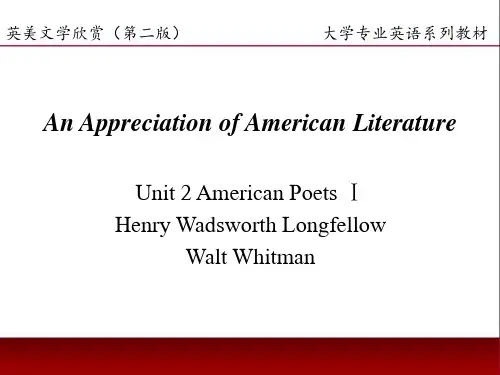
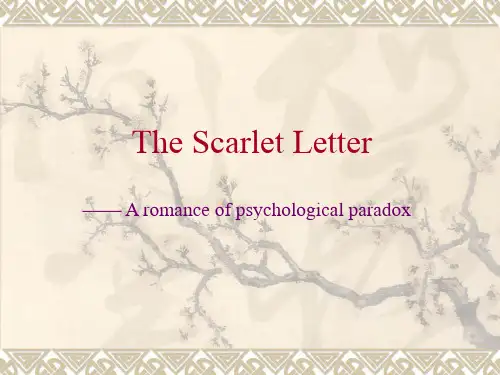
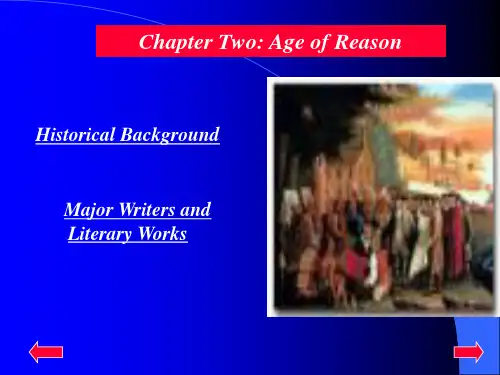
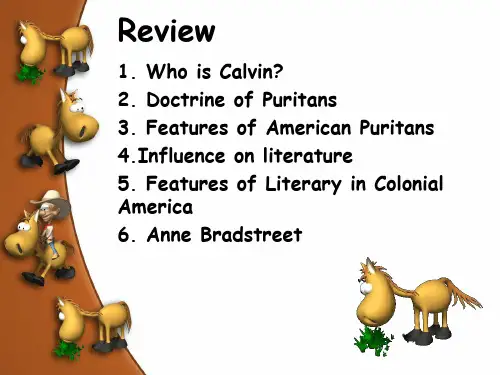
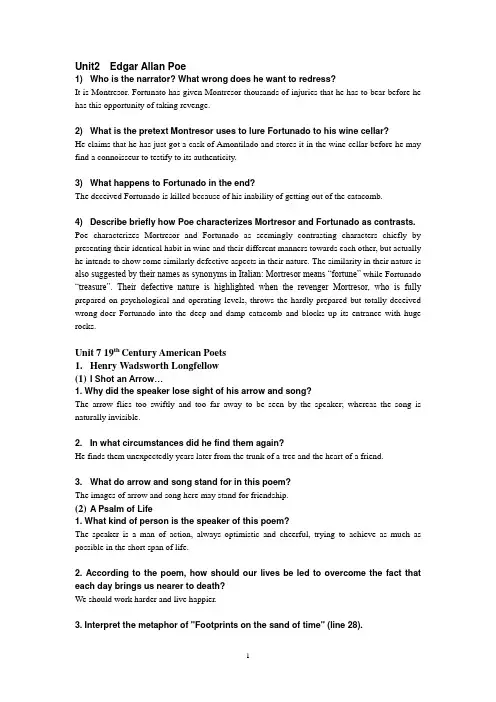
Unit2 Edgar Allan Poe1) Who is the narrator? What wrong does he want to redress?It is Montresor. Fortunato has given Montresor thousands of injuries that he has to bear before he has this opportunity of taking revenge.2) What is the pretext Montresor uses to lure Fortunado to his wine cellar?He claims that he has just got a cask of Amontilado and stores it in the wine cellar before he may find a connoisseur to testify to its authenticity.3) What happens to Fortunado in the end?The deceived Fortunado is killed because of his inability of getting out of the catacomb.4) Describe briefly how Poe characterizes Mortresor and Fortunado as contrasts. Poe characterizes Mortresor and Fortunado as seemingly contrasting characters chiefly by presenting their identical habit in wine and their different manners towards each other, but actually he intends to show some similarly defective aspects in their nature. The similarity in their nature is also suggested by their names as synonyms in Italian: Mortresor means “fortune” while Fortunado “treasure”. Their defective nature is highlighted when the revenger Mortresor, who is fully prepared on psychological and operating levels, throws the hardly prepared but totally deceived wrong-doer Fortunado into the deep and damp catacomb and blocks up its entrance with huge rocks.Unit 7 19th Century American Poets1.Henry Wadsworth Longfellow(1)I Shot an Arrow…1. Why did the speaker lose sight of his arrow and song?The arrow flies too swiftly and too far away to be seen by the speaker; whereas the song is naturally invisible.2. In what circumstances did he find them again?He finds them unexpectedly years later from the trunk of a tree and the heart of a friend.3. What do arrow and song stand for in this poem?The images of arrow and song here may stand for friendship.(2)A Psalm of Life1. What kind of person is the speaker of this poem?The speaker is a man of action, always optimistic and cheerful, trying to achieve as much as possible in the short span of life.2. According to the poem, how should our lives be led to overcome the fact that each day brings us nearer to death?We should work harder and live happier.3. Interpret the metaphor of "Footprints on the sand of time" (line 28).The metaphor refers to human deeds in real life.2. Walt Whitman(1)One's Self I Sing1. What is the significance of singing about one's self?It is an exaltation of the individual spirit, which is typical of American people.2. What is the difference between physiology and physiognomy?Physiology is a science that deals with the functions and life process of human beings, whereas physiognomy refers to an art of judging character from contours of face itself or the appearance of a person.3. What does Whitman mean by the term of "the Modern Man"?He means that a man should be free from any prejudice and pride, totally different from the traditional one, that is full of bias.(3)O Captain! My Captain!1. Why is the word "Captain" capitalized throughout the poem?In this poem the word “Captain” specially refers to Ab raham Lincoln, president of the United States.2. What overall metaphor does the poet employ in this poem?Life is a journey.3. Why do people on the shores exult and bells ring, while the speaker remains sosad?They welcome the ship returning from its hard trip, whereas the speaker is sad because the captain fails to receive his own honor.3.Emily Dickinson(1)To Make a Prairie …1. What things are needed to "make" a prairie? In what sense can one really do it? Some grass and insects and small animals. People can make a prairie with their imagination.2. How can "revery alone" create a prairie?The prairie stays in one's mind.(2) Success Is Counted Sweetest1. Why is success "counted sweetest by those who ne'er succeed"?Those who have tasted the bitterness of failure would have a keener desire for success.2. Who are "the purple host"?The so-called successful people in the world.3. Who is "he" in the last stanza?Anyone who is pursuing his success.(3) I'm Nobody!1. Who are the "pair of us" and "they" in this poem?The "pair of us" refers to the speaker in the poem and the reader, and "they" refers to the public, especially those in power.2. What does "an admiring bog" really mean?" (line 28).It Implies the vain and empty common people, who are always admiring and pursuing the celebrities.3. What is the theme of this poem?The real admirable life is a secluded and common one.4. Do you want to be "nobody" or "somebody"? Explain your reasons.Different persons would have different answers to this question. Personally, I prefer to be nobody.Unit 17 20th-Century American Poets1.Ezra PoundIn A Station of the Metro1. Why does the poet call the faces of pedestrians "apparition"?These pedestrians are all walking in a hurry amidst the drizzling rain.2. What do "petals" and "bough" stand for?Petals refer to the faces while the bough stands for the floating crowd.2. Wallace StevensAnecdote of the Jar1. What does the jar in poem symbolize? Why does the speaker place it on top of a hill?The jar here symbolizes a certain perspective on looking at this world. If the perspective of the viewing is creative and unique, it will change the conventional order of the old world. When a new perspective comes out, it will certainly hold attention from the rest.2. The jar is "round" and "of a port in air," meaning that it has a stately importance. What effect does it have on surroundings when placed on the ground?Maybe the round jar assumes the air of a domineering figure, which helps to form a certain order out of the disordered surrounding.3. How did the wilderness of Tennessee characterized? What words or phrases does the poet use to describe it?Tennessee seems to a place full of life and energy. “Slovenly,” “sprawl” and “wild” are some of the words used to describe the place. (See Anecdote of the Jar )3. William Carlos WilliamsWilliam Carlos Williams1. How does the first two lines differ from the other pairs of lines?Each of the last three couplets creates a visual image (“a red wheelbarrow,” “glaz ed with rainwater,” and “the white chickens”), whereas the first one does not.2. What is the most visually compelling word in each of the last three pairs of lines? They are “red, glazed and white”. (See EXPLANA TION: “The Red Wheelbarrow” below)3. What is the meaning of "depends upon" in the first pair of lines?The opening lines set the tone for the rest of the poem. Since the poem is composed of one sentence broken up at various intervals, it is truthful to say that 'so much depends upon' each line of the poem. This is so because the form of the poem is also its meaning. This may seem confusing, but by the end of the poem the image of the wheelbarrow is seen as the actual poem, as in a painting when one sees an image of an apple, the apple represents an actual object in reality, but since it is part of a painting the apple also becomes the actual piece of art. These lines are also important because they introduce the idea that 'so much depends upon' the wheelbarrow.SEE answer 1.4.Robert Frost(1)Fire and Ice1. What are the symbolic meanings of fire in this poem?Fire symbolizes natural disaster, human passion, as well as war.2. Why does the speaker say that ice is also great for destruction? Explain what ice stands for here.Ice, oppose to fire, is also a dreadful natural disaster in this world, and ice is always related to indifference, coldness, hatred, and the other negative sentiments of human beings.3. What is your opinion about fire and ice? Which one is more destructive?Both fire and ice can destroy this beautiful world if they are beyond control of human beings. Therefore we should be open-minded and reduce our prejudice and pride so as to keep this world in peace.(2)Stopping By Woods On a Snowy Evening1. In your opinion, what was the reason that made the speaker stop by the woods on a snowy evening?The poet was deeply attracted by the natural beauty of the scene at that very moment.2. Why did the horse give the harness bell a shake?The horse grew impatient by stopping in the middle of the dark, cold woods at midnight. It was eager to go home.3. Why couldn't the speaker stay longer by the woods to appreciate its mysterious beauty?He realized that it was late at night and he would have to hurry home to get some food and sleep,because the next morning he would have a lot of work to do.4. What is the effect of repetition in the last two lines?The refrain-like repetition in the last two lines reminds the reader a simple fact of life: whatever happens, one must go forward in the journey of his or her life.(3) The Road Not Taken1. What is the speaker's initial response to the divergence of the two roads?The speaker is at a loss which road he should choose, and he feels sorry that he cannot explore both roads at the same time.2. Describe the similarities and differences of these two roads. Which one does the speaker take?Two roads are similar except one of them is more “grassy,” which implies that it is less traveled by people. The speaker prefers the less traveled one, because he likes adventure.3. What might the two roads stand for in the speaker's mind?One road stands for the traditional one and the other is unconventional one and full of challenges and difficulties. To follow other people's footsteps or to open a new road for himself is really not an easy decision for us to make in our lives.5. Langston Hughes(1)Dreams1. Why must we stick to our dreams?If God is not the first move in our life, surely our dreams are the same.2. What images does the poet employ to describe the life once we lose our dreams? Without dreams our life will be a broken bird and a barren field. I think without dream our life will be a grand ship drifting on the vast ocean, never knowing its destination.(2)Me And The Mule1. Why does the speaker identify himself with the mule?They share a lot in their life: hard-working and full of strength, submissiveness and kindness and honesty.2. What figure of speech does the poet employ in describing the mule? Personification.。
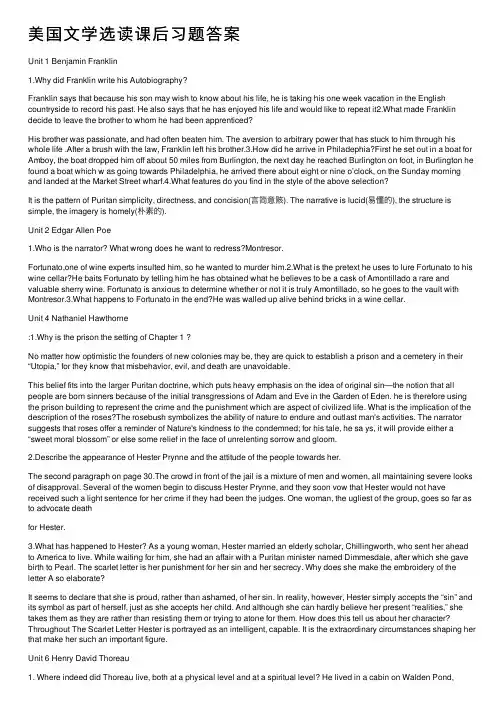
美国⽂学选读课后习题答案Unit 1 Benjamin Franklin1.Why did Franklin write his Autobiography?Franklin says that because his son may wish to know about his life, he is taking his one week vacation in the English countryside to record his past. He also says that he has enjoyed his life and would like to repeat it2.What made Franklin decide to leave the brother to whom he had been apprenticed?His brother was passionate, and had often beaten him. The aversion to arbitrary power that has stuck to him through his whole life .After a brush with the law, Franklin left his brother.3.How did he arrive in Philadephia?First he set out in a boat for Amboy, the boat dropped him off about 50 miles from Burlington, the next day he reached Burlington on foot, in Burlington he found a boat which w as going towards Philadelphia, he arrived there about eight or nine o’clock, on the Sunday morning and landed at the Market Street wharf.4.What features do you find in the style of the above selection?It is the pattern of Puritan simplicity, directness, and concision(⾔简意赅). The narrative is lucid(易懂的), the structure is simple, the imagery is homely(朴素的).Unit 2 Edgar Allen Poe1.Who is the narrator? What wrong does he want to redress?Montresor.Fortunato,one of wine experts insulted him, so he wanted to murder him.2.What is the pretext he uses to lure Fortunato to his wine cellar?He baits Fortunato by telling him he has obtained what he believes to be a cask of Amontillado a rare and valuable sherry wine. Fortunato is anxious to determine whether or not it is truly Amontillado, so he goes to the vault with Montresor.3.What happens to Fortunato in the end?He was walled up alive behind bricks in a wine cellar.Unit 4 Nathaniel Hawthorne:1.Why is the prison the setting of Chapter 1 ?No matter how optimistic the founders of new colonies may be, they are quick to establish a prison and a cemetery in their “Utopia,” for they know that misbehavior, evil, and death are unavoidable.This belief fits into the larger Puritan doctrine, which puts heavy emphasis on the idea of original sin—the notion that all people are born sinners because of the initial transgressions of Adam and Eve in the Garden of Eden. he is therefore using the prison building to represent the crime and the punishment which are aspect of civilized life. What is the implication of the description of the roses?The rosebush symbolizes the ability of nature to endure and outlast man's activities. The narrator suggests that roses offer a reminder of Nature's kindness to the condemned; for his tale, he sa ys, it will provide either a “sweet moral blossom” or else some relief in the face of unrelenting sorrow and gloom.2.Describe the appearance of Hester Prynne and the attitude of the people towards her.The second paragraph on page 30.The crowd in front of the jail is a mixture of men and women, all maintaining severe looks of disapproval. Several of the women begin to discuss Hester Prynne, and they soon vow that Hester would not have received such a light sentence for her crime if they had been the judges. One woman, the ugliest of the group, goes so far as to advocate deathfor Hester.3.What has happened to Hester? As a young woman, Hester married an elderly scholar, Chillingworth, who sent her ahead to America to live. While waiting for him, she had an affair with a Puritan minister named Dimmesdale, after which she gave birth to Pearl. The scarlet letter is her punishment for her sin and her secrecy. Why does she make the embroidery of the letter A so elaborate?It seems to declare that she is proud, rather than ashamed, of her sin. In reality, however, Hester simply accepts the “sin” and its symbol as part of herself, just as she accepts her child. And although she can hardly believe her present “realities,” she takes them as they are rather than resisting them or trying to atone for them. How does this tell us about her character? Throughout The Scarlet Letter Hester is portrayed as an intelligent, capable. It is the extraordinary circumstances shaping her that make her such an important figure.Unit 6 Henry David Thoreau1. Where indeed did Thoreau live, both at a physical level and at a spiritual level? He lived in a cabin on Walden Pond,which belonged t o Emerson’s property.2.Had Thoreau ever bought a farm? Why did he enjoy the act of buying? No, he h adn’t. He avoided purchasing a farm because it would inevitably tie him down financially and complicate his life. Thoreau didn’t see the acquisition of wealth as the goal for human existence, he saw the goal of life to be an exploration of the mind and of the magnificent world around us. He regarded the places as an existence free of obligations and full of leisure.3. Is it significant that Thoreau mentioned the Fourth of July as the day on which he began to stay in the woods? Why? Yes, it is. Because The Fourth of July is known as Independence Day, the birthday of the United States. Here Thoreau uses the day to express his beginning of regeneration at Walden. It also means a symbol of his conquest of being.Unit 7 19th Century American Poets1. Henry Wadsworth Longfellow(1) I Shot an Arrow…1. Why did the speaker lose sight of his arrow and song?The arrow flies too swiftly and too far away to be seen by the speaker; whereas the song is naturally invisible.2. In what circumstances did he find them again?He finds them unexpectedly years later from the trunk of a tree and the heart of a friend.3. What do arrow and song stand for in this poem?The images of arrow and song here may stand for friendship.(2) A Psalm of Life1. What kind of person is the speaker of this poem?The speaker is a man of action, always optimistic and cheerful, trying to achieve as much as possible in the short span of life.2. According to the poem, how should our lives be led to overcome the fact that each day brings us nearer to death?We should work harder and live happier.3. Interpret the metaphor of "Footprints on the sand of time" (line 28).The metaphor refers to human deeds in real life.2. Walt Whitman(1) One’s Self I Sing1. What is the significance of singing about one's self? It is an exaltation of the individual spirit, which is typical of American people.2. What is the difference between physiology and physiognomy?Physiology is a science that deals with the functions and life process of human beings, whereas physiognomy refers to an art of judging character from contours of face itself or the appearance of a person.3. What does Whitman mean by the term of "the Modern Man"?He means that a man should be free from any prejudice and pride, totally different from the traditional one that is full of bias.(3) O Captain! My Captain!1. Why is the word "Captain" capitalized throughout the poem?In this poem the word “Captain” specially refers to Abraham Lincoln, president of the United States.2. What overall metaphor does the poet employ in this poem? Life is a journey.3. Why do people on the shores exult and bells ring, while the speaker remains so sad?They welcome the ship returning from its hard trip, whereas the speaker is sad because the captain fails to receive his own honor.3. Emily Dickinson(1) To Make a Prairie …1. What things are needed to "make" a prairie? In what sense can one really do it?Some grass and insects and small animals. People can make a prairie with their imagination. 2. How can "revery alone" create a prairie?The prairie stays in one's mind.(2) Success Is Counted Sweetest1. Why is success "counted sweetest by those who ne'er succeed"?Those who have tasted the bitterness of failure would have a keener desire for success.2. Who are "the purple host"?The so-called successful people in the world.3. Who is "he" in the last stanza? Anyone who is pursuing his success.(3)I'm nobody!1. Who are the "pair of us" and "they?"in this poem? The "pair of us" refers to the speaker in the poem and the reader, and "they" refers to the public, especially those in power.2. What does "an admiring bog" really mean?" (line 28). It implies the vain and empty common people, who are always admiring and pursuing the celebrities.3. What is the theme of this poem?The real admirable life is a secluded and common one.4. Do you want to be "nobody" or "somebody"? Explain your reasons. Different persons would have different answers to his question. Personally, I prefer to be nobody.Unit8 mark twainQuestions1: Why do you think Mr. Wheeler is so eager to tell these stories?From Mr. Wheeler’s behaviors and contents of his narration. First, when "I" asked him to tell "me" something about W. Smiley, he “backed me into a corner and blockaded me with his chair, and then sat down and reeled off the narrative”. And during the process of telling his stories, he never paid any attention to others' response to his story and just went on telling what amused him. At last when the listener felt boring and wanted to leave, Mr. Wheeler even didn't notice it and still asked him to sit there listening to him.Question2: Does his audience share his enthusiasm in telling the stories?No. the audience does not show any interest in Mr. Wheeler’ stories. In fact, the narrator was very feverish about his stories, but, in the eyes of the listener, the stories were very boring and had nothing to do with his preoccupation. As an educated man, the listener couldn't understand the way of laborers for joy, and he would never bother himself to understand it. So after the longtime of Mr. Wheeler’ solo narration and when the audience got a chance, he fled away. Question3: Do you think the narrator and his listener ever suspect the presence of humor? Why? How do you interpret their interactions?The narrator and his listener never noticed or suspected the presence of humor. During the intercourse, the narrator went vigorously on his monotonous narrative "without a little smiling" talking about the animals and the things like, while the listener felt rather puzzled or bothered by his stories. It seemed to be kind of coarse things. So the two different scenes go on separately without an intersection. And their interaction was a complete failure according tour common sense about communication. But it in this sense produced the effect of humor which can be tasted by our readers due to the skills adopted by Mark Twain .Unit14 The Great GatsbyDo you think G atsby deserv es to be called “the great”? Why?(1)I think it is too complicated to simply say Gatsby deserves to be ―great‖or not.For one thing, Gatsby was ambitious, hardworking, generous and passionate. He was so extremely loyal to his love and Daisy that he could do anything to get Daisy back. In this respect, he ismuch ―greater‖ than his contemporaries. For another thing, Gatsby never realized that Daisy wasn’t the girl he loved anymore. Gatsby was so innocent that he staked everything on his dreams, not realizing that his dreams are unworthy of him. He wasn’t sober enough to be great. 2.Does “the green light” Gatsby believed in exist in reality? Why orwhy not ?(1)I think ―the green light‖does not exist in reality. Because the green light which situated at th e end of Daisy’s East Egg dock and barely visible from West Egg lawn represents Gatsby’s unattainable dream. Although the color itself can be seen as hope and bright future, Gatsby’s quest for Daisy back is doomed to be impossible. Daisy livedin ―a materi al world without being real, where poor ghosts, breathing dream like air‖. The distinction between ideal and reality was huge. As if American dream between golden past and golden future always suffered from the realistic betrayal and crush.3.What does Gats by’s Schedule reveal about him and how does it relate to the American Dream?(1)The schedule is a reflection of Gatsby’s determination and ambition. It reveals that he is hard on himself in pursuitof his goal—to be an upper-class man.(2)On one hand, we can know that he is persistent in pursuing his American Dream-- to attain wealth and happiness through his struggle. On the other hand, he is too idealistic and naive. The girl he loves is as vulgar andsuperficial as others in her circle, she is unable to meetsGatsby’s romantic fantasy. So his dream is destined to shatter,which indicates the disillusion of American Dream. 4.Whenyou read the line “He (the man with owl-eyed glasses)took off his glasses and wiped them again, outside andin ,” what images does it create in your mind, given thenovel’s numerous references to the strikingly strangescene of the spectacled eyes?(1)From this line , superficially, owl-eyes is a person with thick and blurry glasses who can not see clearly all the things in the world. However, we know he is actually an owl-wise observer and sees more clearly than anyone else in the novel. Owl-Eyes, except Nick, is the only friend to appear at the rain-soaked burial of Gatsby, when others are unwilling to come. He feels sympathy for Gat sby’s tragedy.Unit 16 Ernest Hemingway1.How do you interpret the irony of the title after readingthe story?(1)The title ―A Clean Well-Lighted Place‖ refers to thecaféin the text. The caféwas very clean and well- lighted.From the literary meaning, we may feel this place was verywarm and comfortable, was a place where people needwarmth wanted to go. So the old man, who was rich butdeaf and lonely came here to find warmth and avoided nada.It was the only place he could go and could find somecomfort.(2)However, the younger waiter was very selfish.Therefore, he refused to offer the old man another cup ofwine by the excuse that the business was finished. This caféshould be warm but the younger waiter forced the lonely anddeaf to leave without any sympathy. This is the irony of thetitle.2.Do you think youth and confidence can help onewithstand the metaphorical dark?Why or why not?(1)I don’t think so.In our opinion, the m etaphorical darkmeans nada,nothing in one’s inner heart. In the article, the younger waiter had both youth and confidence; however, he never made full use of them. As we can see, he didn’t understand the old man’s suicide and excessive drinking, and failed to see his tomorrow through the old man’s present situation.3.The older wait er said to the younger waiter:“We are of two different kinds.” In what way do you think they are different? (1)I think they are different from each other in the following four aspects:In the beginning, they are in different ages.The older waiter was in his middle age; while the other was much younger.(2)Then, they have different attitudes towards the old man. From the article, the older waiter could understand the old manand show sympathy to him. However, the young man was very selfish. He showed hatred rather than sympathy to the old man.(3)Next, they have different attitudes towards life. The older waiter had a deep sense of life. He was brave and wanted to fight again nada. Besides, he cared about others. he has a shadow understanding of life. He satisfied with his present love and work, he only care about himself. He even never thought of his future.(4)Finally, they have different attitudes towards nada. The older waiter had realized that it is impossible to avoid nada in one’s whole life. The only thing h e can do is to keep a kind of clearness in his own mind. But out of youth and confidence, he failed to overcome nada. On the contrary, the younger waiter had the two most important factors for withstanding nada; however, he didn’t realize the nada in his heart at all. Then his youth a nd confidence became useless.Unit 17 20th -Century American Poets1.Ezra Pound In A Station of the Metro1.Why does the poet call the faces of pedestrians "apparition"?These pedestrians are all walking in a hurry amidst the drizzling rain. What do "petals" and "bough" stand for? Petals refer to the faces while the bough stands for the floating crowd.2.Wallace Stevens Anecdote of the Jar1.What does the jar in poem symbolize? Why does the speaker place it on top of a hill?The jar here symbolizes a certain perspective on looking at this world. If the perspective of the viewing iscreative and unique, it will change the conventional order of the old world. When a new perspective comes out, it will certainly hold attention from the rest.2. The jar is "round" and "of a port in air," meaning that it has a stately importance. What effect does it have on surroundings when placed on the ground? Maybe the round jar assumes the air of a domineering figure, which helps to form a certain order out of the disordered surrounding.3. How did the wilderness of Tennessee characterized? What words or phrases does the poet use to describe it?Tennessee seems to a place full of life and energy. “Slovenly,” “sprawl” and “wild” are some of the words used to describe the place. (See Anecdote of the Jar ) 3.Robert Frost(1)Fire and Ice 1. What are the symbolic meanings of fire in this poem? Fire symbolizes natural disaster, human passion, as well as war. 2. Why does the speaker say that ice is also great for destruction? Explain what ice stands for here. Ice, oppose to fire, is also a dreadful natural disaster in this world, and ice is always related to indifference, coldness, hatred, and the other negative sentiments of human beings. 3. What is your opinion about fire and ice? Which one is more destructive? Both fire and ice can destroy this beautiful world if they are beyond control of human beings. Therefore we should be open-minded and reduce our prejudice and pride so as to keep this world in peace.(2)Stopping By Woods On a Snowy Evening 1. In your opinion, what was the reason that made the speaker stop by the woods on a snowy evening? The poet was deeply attracted by the natural beauty of the scene at that very moment. 2. Why did the horse give the harness bell a shake? The horse grew impatient by stopping in the middle of the dark, cold woods at midnight. It was eager to go home.3. Why couldn't the speaker stay longer by the woods to appreciate its mysterious beauty? He realized that it was late at night and he would have to hurry home to get some food and sleep, because the next morning he would have a lot of work to do.4. What is the effect of repetition in the last two lines? The refrain-like repetition in the last two lines reminds the reader a simple fact of life: whatever happens, one must go forward in the journey of his or her life.(3) The Road Not Taken 1. What is the speaker's initial response to the divergence of the two roads? The speaker is at a loss which road he should choose, and he feels sorry that he cannot explore both roads at the same time. 2. Describe the similarities and differences of these two roads. Which one does the speaker take?Two roads are similar except one of them is more “grassy,” which impl ies that it is less traveled by people. The speaker prefers the less traveled one, because he likes adventure. 3. What might the two roads stand for in the speaker's mind? One road stands for the traditional one and the other is unconventional one and full of challenges and difficulties. To follow other people's footsteps or to open a new road for himself is really not an easy decision for us to make in our lives.。
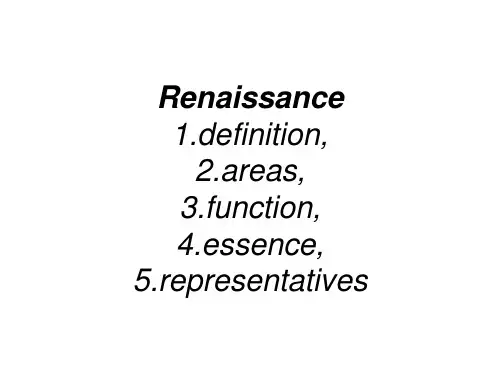
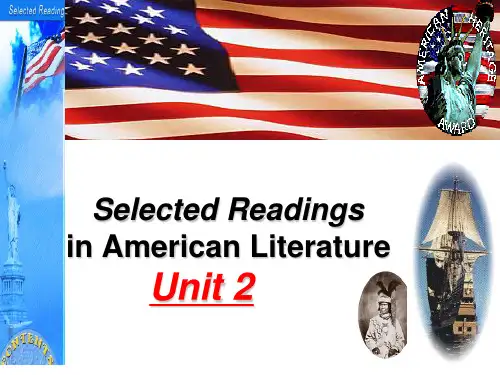
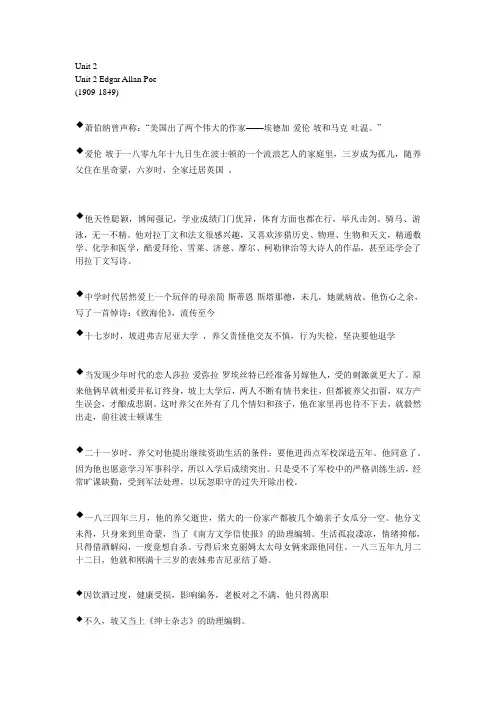
Unit 2Unit 2 Edgar Allan Poe(1909-1849)♦萧伯纳曾声称:“美国出了两个伟大的作家——埃德加·爱伦·坡和马克·吐温。
”♦爱伦·坡于一八零九年十九日生在波士顿的一个流浪艺人的家庭里,三岁成为孤儿,随养父住在里奇蒙,六岁时,全家迁居英国。
♦他天性聪颖,博闻强记,学业成绩门门优异,体育方面也都在行,举凡击剑、骑马、游泳,无一不精。
他对拉丁文和法文很感兴趣,又喜欢涉猎历史、物理、生物和天文,精通数学、化学和医学,酷爱拜伦、雪莱、济慈、摩尔、柯勒律治等大诗人的作品,甚至还学会了用拉丁文写诗。
♦中学时代居然爱上一个玩伴的母亲简·斯蒂恩·斯塔那德,未几,她就病故。
他伤心之余,写了一首悼诗:《致海伦》,流传至今♦十七岁时,坡进弗吉尼亚大学,养父责怪他交友不慎,行为失检,坚决要他退学♦当发现少年时代的恋人莎拉·爱弥拉·罗埃丝特已经准备另嫁他人,受的刺激就更大了。
原来他俩早就相爱并私订终身,坡上大学后,两人不断有情书来往,但都被养父扣留,双方产生误会,才酿成悲剧。
这时养父在外有了几个情妇和孩子,他在家里再也待不下去,就毅然出走,前往波士顿谋生♦二十一岁时,养父对他提出继续资助生活的条件:要他进西点军校深造五年。
他同意了。
因为他也愿意学习军事科学,所以入学后成绩突出。
只是受不了军校中的严格训练生活,经常旷课缺勤,受到军法处理,以玩忽职守的过失开除出校。
♦一八三四年三月,他的养父逝世,偌大的一份家产都被几个嫡亲子女瓜分一空。
他分文未得,只身来到里奇蒙,当了《南方文学信使报》的助理编辑。
生活孤寂凄凉,情绪抑郁,只得借酒解闷,一度竟想自杀。
亏得后来克丽姆太太母女俩来跟他同住。
一八三五年九月二十二日,他就和刚满十三岁的表妹弗吉尼亚结了婚。
♦因饮酒过度,健康受损,影响编务,老板对之不满,他只得离职♦不久,坡又当上《绅士杂志》的助理编辑。
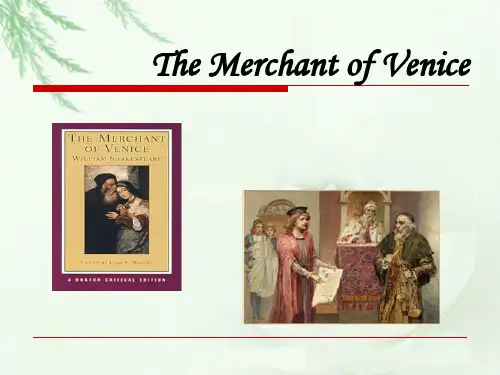
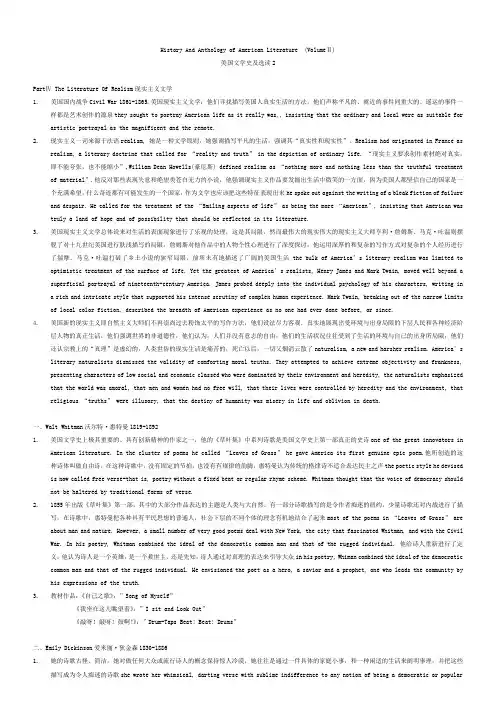
History And Anthology of American Literature (VolumeⅡ)美国文学史及选读2PartⅣ The Literature Of Realism现实主义文学1.美国国内战争Civil War 1861-1865.美国现实主义文学:他们寻找描写美国人真实生活的方法,他们声称平凡的、就近的事件同重大的、遥运的事件一样都是艺术创作的源泉they sought to portray American life as it really was,, insisting that the ordinary and local were as suitable for artistic portrayal as the magnificent and the remote.2.现实主义一词来源于法语realism, 她是一种文学原则,她强调描写平凡的生活,强调其“真实性和现实性”。
Realism had originated in France asrealism, a literary doctrine that called for “reality and truth” in the depiction of ordinary life. “现实主义要求创作素材绝对真实,即不能夸张,也不能缩小”,William Dean Howells(豪厄斯) defined realism as “nothing more and nothing less than the truthful treatment of material”.他反对那些表现失意和绝望类苍白无力的小说,他强调现实主义作品要发掘出生活中微笑的一方面,因为美国人都坚信自己的国家是一个充满希望,什么奇迹都有可能发生的一个国家,作为文学也应该把这些特征表现出来he spoke out against the writing of a bleak fiction of failure and despair. He called for the treatment of the “Smiling aspects of life” as being the more “American”, insisting that Americ an was truly a land of hope and of possibility that should be reflected in its literature.3.美国现实主义文学总体说来对生活的表面现象进行了乐观的处理,这是其局限,然而最伟大的现实伟大的现实主义大师亨利·詹姆斯、马克·吐温则摆脱了对十九世纪美国进行肤浅描写的局限,詹姆斯对他作品中的人物个性心理进行了深度探讨,他运用深厚的和复杂的写作方式对复杂的个人经历进行了揣摩。
美国文学(第二部分)(专八英美文学整理)18世纪末-19世纪中后浪漫主义时期Romanticism1. 早期浪漫主义华盛顿·欧文美国文学之父father of American Literature(为美国文学第一次赢得世界声誉)Washington Irving 以笔记小说和历史传厅闻名,humor1783-1859 The Sketch Book见闻札记(标志浪漫主义开始)A History of New Y ork纽约史---美国人写的第一部诙谐文学杰作;----The Legend of Sleepy Hollow睡谷的传说---成为美国第1个获国际声誉作家-----Rip V an Winkle里普·万·温克尔(李伯大梦)The Alhambra阿尔罕伯拉詹姆斯·费尼莫尔·库珀frontier novel边疆传奇小说sea novelJames Fenimore Cooper The Spy间谍(独立战争间谍对抗英国)1789-1851 The Pilot领航者(sea novel)Leatherstocking Tales皮袜子五步曲(frontier novel)The Pioneer拓荒者(the first true romance of the frontier in American literatureThe Last of Mohicans最后的莫希干人(主角:Natty Bumppo 纳蒂班波)The Prairie大草原The Pathfinder探路者The Deerslayer杀鹿者2. 超验主义New England Transcendentalism拉尔夫·沃尔多·爱默生Nature论自然-----新英格兰超验主义者的宣言书manifesto Ralf Waldo Emerson The American Scholar论美国学者;1803-1882 Self-reliance论自立The Transcendentalist超验主义者Representative Men代表人物School Address神学院演说Days日子-首开自由诗之先河free verse亨利·大卫·梭罗Walden瓦尔登湖Henry David Thoreau A Week on the Concord and Merrimack Rivers在康科德河和梅里麦克河上的一周1817-1862 Civil Disobedience论公民之不服从纳撒尼尔·霍桑subject: human soul first great American writer of fiction 象征主义大师Nathaniel Hawthorne The Scarlet Letter红字1804-1864 Twice-told Tales尽人皆知的故事Mosses from an Old Manse古屋青苔The House of the Seven Gables有七个尖角阁的房子The Marble Faun玉石雕像The Blithedale Romance福谷传奇Y oung Goodman Brown年轻的布朗The Birthmark胎记赫尔曼·迈尔维尔擅长航海奇遇和异域风情Herman Melville Moby Dick/The White Whale白鲸(first American prose epic史诗)1819-1891 Typee泰比Omoo奥穆Mardi玛地White Jacket白外衣Pierre皮尔埃; Billy Budd比利·巴德沃尔特·惠特曼Father of free verse自由诗之父Walt Whitman Leaves of Grass草叶集(the birth of truly American poetry and the endof romanticism)(共和圣经Democratic Bible美国史诗American Epic)1819-1892 Song of Myself自我之歌Democratic V istas民主的前景埃米莉·迪金森她的诗大量破折号dash,主题love, nature, death, immortality; 语言plain, brevity, directEmily Dickinson This is My Letter to the World这是我给世界的一封信1830-1886I Heard a Fly Buzz When I Died我死时听到一只苍蝇叫Because I could not Stop for Death因为我不能等待死神I’m Nobody. Who Are Y ou?我是无名小卒。